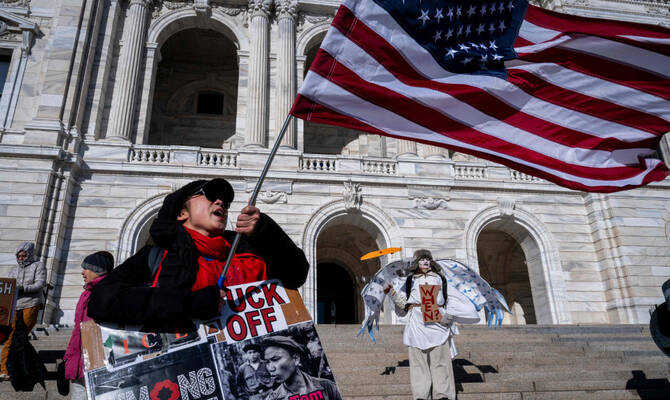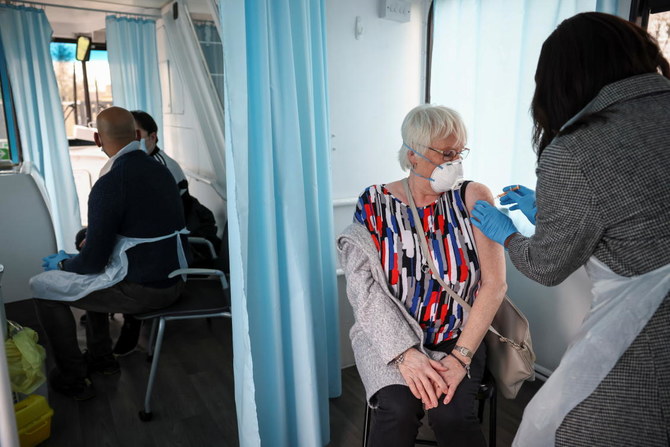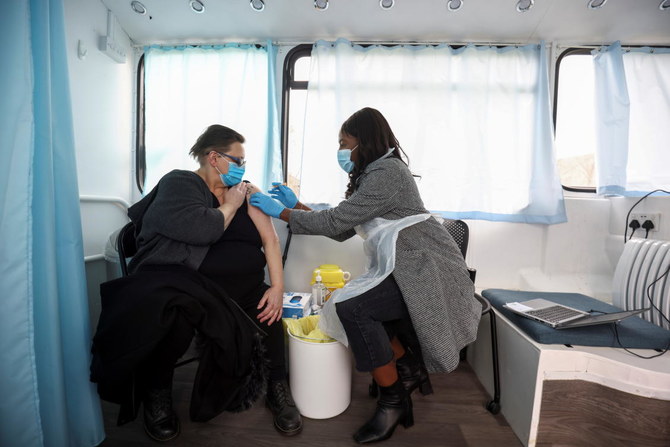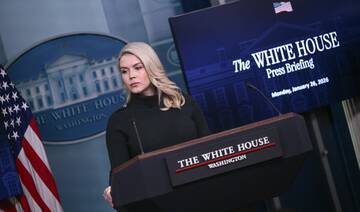LONDON: The UK government said Sunday that it reached its goal of giving at least one COVID-19 vaccine shot to the most vulnerable people in the country, increasing pressure on ministers to clarify when they will ease a lockdown imposed in early January.
Some 15 million people, or 22% of the UK population, have received their first shot or were offered one. The figure includes most people in the government’s top four priority groups, including everyone over 75, frontline healthcare workers and nursing home staff.
“15,000,000! Amazing team,'' Nadhim Zahawi, the vaccines minister, said in a tweet that featured a red heart. “We will not rest till we offer the vaccine to the whole of phase1 the 1-9 categories of the most vulnerable & all over 50s by end April and then all adults.''
British Prime Minister Boris Johnson plans to unveil his roadmap for easing restrictions on Feb. 22 amid signs that infection rates, hospitalizations and deaths have fallen sharply since England’s third national lockdown began on Jan. 4.
Jockeying has already begun between those who want the measures lifted as soon as possible and those who fear moving too fast will lead to a resurgence of the virus.
Britain got a head start on its vaccination effort in December, when it became the first country to authorize widespread use of a COVID-19 shot. It ranks behind only Israel, 71%, the Seychelles, 53%, and the United Arab Emirates, 50% in the percentage of people who have received one dose, according to data compiled by Oxford University. The US is fifth at 15%.
At the same time, rules that have closed schools, restaurants and nonessential shops in the UK are starting to pay off. The number of new infections, hospital admissions and deaths recorded over the past seven days have all dropped by more than 20% from the previous week, according to government figures.
When Johnson announced the lockdown, he said the government would review the measures in mid-February based on their success in controlling the pandemic and progress in the vaccination effort. Johnson’s first priority is to reopen schools, and he has promised to give schools two weeks notice to give teachers time to prepare for the return of students.
The prime minister on Saturday applauded the vaccine rollout but urged people to be cautious.
“We have still got infections running very high throughout the country — levels which last year we would have thought were really very high indeed — (and) still, sadly, a great many deaths in our hospitals,” he said during a visit to a vaccine manufacturing facility in northeastern England. “Although the number is beginning to come down, and perhaps starting to come down quite fast, we need to look at the data very, very hard.”
Britain has reported over 117,000 virus-related deaths, the highest toll in Europe.
Mark Harper, a member of Parliament from the ruling Conservative Party, last week warned the government against “moving the goalposts” for deciding when to ease the lockdown.
Johnson should start by reopening schools, then gradually lift other restrictions as more people are vaccinated, said Harper, who leads a group of about 70 lawmakers who have lobbied for the government to consider the negative economic and social impacts of the restrictions, along with the health benefits.
“If you think about the restrictions that the government’s placed on everybody, they are the toughest set of restrictions that have ever been placed on the British people outside of the Second and First World Wars,” Harper told the BBC. “So it’s kind of just worth stepping back a bit and saying, ‘This isn’t normal, and it shouldn’t continue, frankly, for a moment longer than it’s absolutely necessary.’”
After meeting the target for reaching the most vulnerable people, UK authorities will progressively expand the vaccination drive to the next five priority groups until everyone over 50 and vulnerable younger people with health conditions that put them at higher risk from the virus have been offered the vaccine.
Public health officials say the top nine priority groups account for 99% of the deaths caused by COVID-19 so far.
While the vaccines currently authorized for use in the UK require two doses to ensure full protection against COVID-19, British authorities say one dose provides a significant level of protection.
Because of this, they have made it their priority to give the first dose to as many people as possible as quickly as possible. To do this, Britain has suggested that the second dose be administered after three months, instead of one month as recommended by the manufacturers.
Jeremy Farrar, director of the Wellcome Trust health think tank, said the number of COVID-19 infections in Britain is still too high to think about lifting the restrictions.
“We’ve made enormous progress … but the transmission is incredibly high still and we’ve got to get it lower,” he said.
There are other dangers on the horizon. UK government scientific advisers say the COVID-19 variant now predominant in the country may be up to 70% more deadly than previous variants, underscoring concerns about how mutations may change the characteristics of the disease.
The findings from the New and Emerging Respiratory Virus Threats Advisory Group, published Friday on the government’s website, confirm preliminary research released Jan. 21. The group, known as NERVTAG, includes experts from universities and public agencies across the UK
The new report is based on analysis of a dozen studies that found the so-called Kent variant, named after the county where it was first identified, was 30% to 70% more deadly than other variants. The studies compared hospitalization and death rates among people infected with the variant and those infected with other variants.
“Based on these analyses, it is likely that infection with (the Kent variant) is associated with an increased risk of hospitalization and death compared to infection with non-variant of cancer viruses,” the advisory group said. “It should be noted that the absolute risk of death per infection remains low.”
UK hits target: Gives at least 1 vaccine shot to 15 million
https://arab.news/6y7sy
UK hits target: Gives at least 1 vaccine shot to 15 million

- The UK will start administering vaccines from Monday to those aged between 65 and 69 and the clinically vulnerable to COVID-19
- Britain has registered nearly 117,000 deaths within 28 days of a positive COVID-19 test
Trump says will ‘de-escalate’ in Minneapolis after shooting backlash

- The turmoil could even result in a fresh US government shutdown, with Democrats threatening to block approval of routine spending bills up for votes in the Senate later this week
MINNEAPOLIS, United States: US President Donald Trump said Tuesday he would “de-escalate a little bit” in Minneapolis after the fatal shootings of two civilians fueled a storm of criticism over his signature immigration crackdown.
Trump’s “border czar” Tom Homan met with officials in the city as the Republican attempted damage control after the killing by immigration agents of 37-year-old nurse Alex Pretti on Saturday.
The president also admitted that Gregory Bovino, a hard-line Border Patrol commander who is now expected to leave Minneapolis, was “a pretty out-there kind of a guy” whose presence may not have helped the situation.
“We’re going to de-escalate a little bit,” Trump told Fox News after days of tensions following the shooting of Pretti, while adding that it was not a “pullback.”
Trump said that Homan — the top US border security official, who brings a less confrontational communication style — met with Minnesota Governor Tim Walz and Minneapolis Mayor Jacob Frey Tuesday.
The US president told reporters that he rejected the “assassin” label used by a top aide to describe protester Pretti. “I want a very honorable and honest investigation,” he said.
Yet Trump did not hold back from criticizing Pretti for carrying a licensed firearm that was taken off him before he was shot.
“I don’t like that he had a gun, I don’t like that he had two fully loaded magazines,” the president said.
‘Pretty out there’
Mayor Frey said in a statement after meeting Homan that he discussed the “serious negative impacts this operation has had on Minneapolis,” and that the city “will not enforce federal immigration laws.”
Former Democratic vice presidential candidate Walz said he called for “impartial investigations” into shootings by federal agents in the city as well as a “significant reduction” in federal forces in the state.
Pretti’s death has sparked outrage nationwide.
Democratic former president Joe Biden on Tuesday said the situation “betrays our most basic values as Americans.” Ex-presidents Bill Clinton and Barack Obama have also spoken out.
Pretti, shot multiple times after being knocked to the ground, was the second US citizen killed by immigration officers in Minneapolis this month, turning the city into ground zero of national tensions over Trump’s mass deportation policies.
Protester Renee Good, a mother of three, was shot by an agent at point blank range in her car on January 7.
The killings capped months of escalating violence in which masked, unidentified, and heavily armed Immigration and Customs Enforcement (ICE) and Border Patrol agents have grabbed people suspected of violating immigration laws off the streets.
Despite multiple videos showing that Pretti posed no threat, top officials initially claimed he had been intending to kill federal agents.
Trump backed his under-fire Homeland Security chief Kristi Noem, who described Pretti as a “domestic terrorist,” saying she would not step down and was doing a “very good job.”
But he was less supportive of Bovino, a Border Patrol official famed for reveling in aggressive, televised immigration crackdowns who had also played up the narrative that Pretti had posed a threat.
“Bovino’s very good, but he’s a pretty out there kind of a guy. And in some cases, that’s good, maybe it wasn’t good here,” Trump told Fox.
‘Sickened’
Concern over the violence and the attempt to blame Pretti for his death quickly spread to Washington.
Republican Senator Rand Paul said Tuesday that agents involved in the shooting should be put on administrative leave, later adding that the heads of ICE, Border Patrol and Citizenship and Immigration Services would testify before the Congress next month.
Centrist Democratic Senator John Fetterman said “grossly incompetent” Noem should be fired.
The turmoil could even result in a fresh US government shutdown, with Democrats threatening to block approval of routine spending bills up for votes in the Senate later this week.
“The whole community is just sickened by all this,” said 68-year-old retiree Stephen McLaughlin in Minneapolis. “The aim of the government is to terrorize citizens, it’s really frightening.”
















